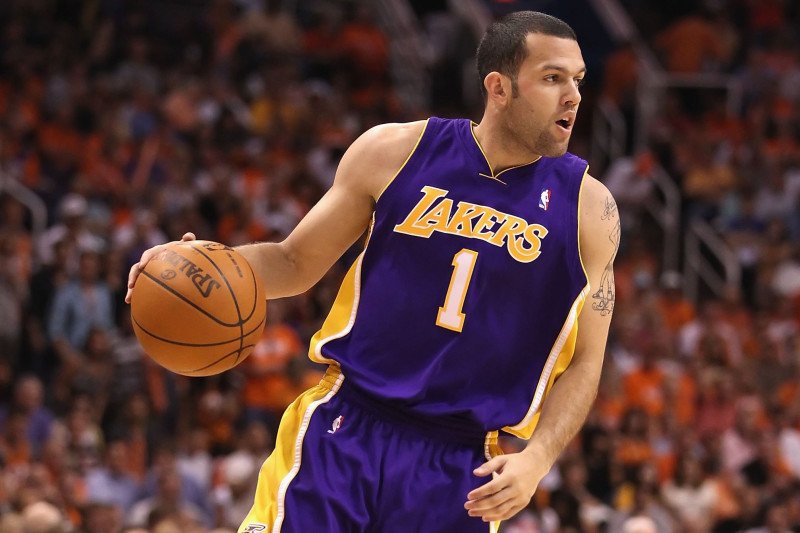Whether he was contending for an NCAA title with UCLA or ballin’ out with Kobe for NBA Championships, Jordan Farmar always took his game seriously. And as much as he worked on his hoops skills, Farmar paid just as much attention to keeping his fitness on point.
Now that he’s retired from basketball and running his own business building high-end homes, Farmar still enjoys working out and playing pickup games in his adopted home of Las Vegas.
He shared some of the fitness secrets he picked up over his decade in the NBA.
Flexibility Is King – Hit the Mats
“I tell people all the time, don’t neglect the importance of flexibility and strength training together. A lot of people want to just lift weights, but forget about the flexibility side of it.
“I was introduced to yoga my second year in the NBA. It became a really big part of both my mental and physical peak performance, for the rest of my career. Yoga’s great for the mental aspects. You’re usually quiet and holding positions for a long time, where it’s uncomfortable and you have to find a way to just quiet everything down and focus on what you’re doing. So, not only is it the physical aspect of actually stretching and helping your body get into positions that will loosen you up and just keep you ready for life every day, but also mentally being able to just get in that space and recenter. While everything else is going on in the world outside, you have a chance to pay your body and your mind some attention.”
Get Lean, Get Mean
“While I was playing, I really tried to stay as light as possible, so I tried to not lift weights. I would do yoga, and that’s a lot of body weight stuff. You can kind of tweak your sessions to make them more strength training, or they can be more flexibility training. It just depends on the way you do it.
“But I noticed when I lifted, I got really heavy, I got bulky, my knees would hurt, my ankles would hurt. The guys that I’m guarding and matched up against are smaller, lighter, faster. So for me, it was about staying as lean as possible throughout my career, not adding mass.”
Don’t Forget to Warm Up
“The weekend warrior doesn’t necessarily have to deal with things like sitting for an hour of real time before jumping into a game and having to perform immediately at a high level. They’re able to take their time and get ready. And as we all get older, we shouldn’t neglect the prep work that is necessary before a workout.
“I play basketball now, and I see guys not warming up or they’re not doing the things to make their body limber, and they go down with a hamstring, a knee, an Achilles — and they don’t have the access to all the stuff that I had while we were playing. One small, little injury can take you out for a long time and really affect your day-to-day life. So, preventative conditioning is crucial. Work on your flexibility. Warm up properly. Take care of your body!”
Build Good Habits
“Now that I’m retired from basketball, I wake up every morning at 6:00 a.m. I’m in the gym by 7:00. Some days, I try to get a yoga session in, and then I do similar strength training to what I did when I was playing. Basketball strength-and-conditioning staffs have a good program for everyday life. It’s not like football, where you’re trying to get super heavy or super bulky. It’s a good mix of balance, stability, and strength training together, as well as some cardio. But I also try to blend in some yoga in there early in the morning, and that gets my day started well.
“Fortunately, throughout my life, I was self-motivated to do those things on my own before anybody put me on a regimen or a schedule, and it became part of my lifestyle early on. So, I’m not having to break any real bad habits. I just have to make sure that I carve out the time, and if it means waking up at 6:00 instead of 9:00, then that’s what I have to do. Once you commit to those things and you just keep doing them, they become habitual. It just becomes second nature.”
Rest & Recover
“I’m still an athlete at heart, and I still take care of myself. But because I don’t play everyday, when I do get out, I feel it afterwards. I don’t want to have a long, lingering injury and be dealing with it for months. So, I use CBD all over my body. I like a good CBD bath. I do CBD foot baths. I have those big party tubs that you put drinks in at a barbecue, and I fill it up with 115-degree water and I put CBD salts in there and sit and soak my feet. When my lower back sometimes gets sore, I use CBD on that, too.
“I mean, we’re all tough guys and want to push through things but, at some point, because I’m not playing at a high level, I don’t have to be ready to perform tomorrow. There’s no need in pushing that soreness and letting it linger. Letting your body recover is just as important as training it.
“And listening to your body, I think that’s a big part of yoga is listening to what your body’s telling you and being in tune with it. You’re spending an hour in different positions and different movements that speak to all parts of your body. You need to be able to accept your body’s feedback and then honor it. If your shoulders hurt, don’t go bench press. You have to be able to say, “I can’t do that this week,” and move on.
“And then, of course, sleep. Your body does so much of its healing overnight. So, sleep is really important. If I’m having problems, I like to use CBD gummies with melatonin. I get a really good night’s sleep and then feel fresh in the morning … so I can get at it again!”


